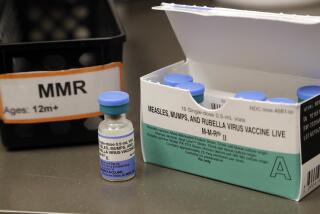3 County Residents Infected with E. Coli in the Last Month
- Share via
A 2-year-old boy from Thousand Oaks remained critically ill and hospitalized Thursday,three weeks after being infected by E. coli bacteria, according to health officials.
The child is one of three unrelated Ventura County residents who have suffered from the E. coli bacteria infection in the past month, said officials.
“We have had occasional cases, most of them associated with eating raw meat,” said Marilyn Billimek, a public health nurse. “[And] with us having this many cases in a month period, it’s not rare any more.”
An Oxnard toddler is still recovering from the disease and a 31-year-old Moorpark woman has recovered, said Elizabeth Huff of the county’s environmental health department. They were not hospitalized.
The Thousand Oaks boy’s infection and one of the others might have been caused when they consumed raw or partly cooked ground beef at home, Billimek said. Two relatives of these people also consumed the meat and had related illnesses with similar symptoms, but they were not confirmed as having E. coli.
An investigation by the county’s public health department and the U.S. Department of Agriculture continues, but it might be difficult to pinpoint the source of the meat because of the time that elapsed between purchasing the meat, the onset of symptoms and the diagnoses, Huff said.
Many strains of E. coli are found in people’s digestive tracts, but the strain that infected the three area residents--known to doctors as E. coli 0157:H7--can cause serious illness, Huff said.
Symptoms include nausea, severe abdominal cramps and watery diarrhea, and usually appear two to nine days after consumption. The disease lasts for about four to 10 days, Huff said.
The Thousand Oaks child suffered complications that led to kidney problems, Huff said.
The E. coli bacterium gained its reputation in 1993 when four children died after consuming contaminated hamburgers at a Jack-in-the-Box restaurant in Washington state and again last summer when one child died and at least 12 others contracted the infection from a water park in Georgia.
People can be exposed to the bacteria in food, water and feces, Huff said.
The bacteria’s effects vary and are determined by the amount ingested, Billimek said.
“It’s both dose-related and age-related,” she said. “We more often see it in the very young and very old or persons who have a chronic health condition.”
There is no specific treatment for the disease, Billimek said.
People can protect themselves by cooking meat safely and washing their hands, Huff said.
“There are still people not doing this and that’s a high-risk behavior,” she said. “You can’t assume that food products you buy are bacteria free. You have to properly handle them to prevent an illness. Think before you eat a raw burger.”
Meat must be cooked to an internal temperature of at least 160 degrees Fahrenheit to kill the bacteria, Billimek said.
“Cook ground beef--cook the meat until it runs clear with no blood oozing,” she said. “A lot of people who like raw meat have a hard time with that. It used to be OK to do that, but now we have bacteria that’s causing disease and we have to change our ways.”
FYI
You can guard against E. coli and other harmful pathogens by following these safety tips:
* Do not eat raw meat or rare ground beef. Thorough cooking destroys E. coli. Cook meat until it has an internal temperature of at least 160 degrees Fahrenheit. Use a meat thermometer to accurately test the internal temperature. Do not rely on color to determine if the meat is thoroughly cooked.
* Use hot, soapy water to wash hands well before and after handling raw meat and poultry. Wash and sanitize utensils, cutting boards and work areas that have come into contact with raw meat and poultry. Do not serve or cut cooked meat or other foods on a platter that held raw meat.
* When eating out, send back any meat product that does not appear to be thoroughly cooked. Keep meat refrigerated at 41 degrees or below. Use ground beef within one to two days after you purchase it or freeze it.
* Even if you freeze the meat, you must thoroughly cook it before eating to destroy E. coli. Thaw meat in the refrigerator, not on the kitchen counter. Store raw meat on a platter on the bottom shelf in the refrigerator to prevent meat juices from dripping onto other foods and contaminating them. Do not partly cook meat ahead of time. Bacteria can grow in partly cooked meat as it cools, even in the refrigerator.
More to Read
Sign up for Essential California
The most important California stories and recommendations in your inbox every morning.
You may occasionally receive promotional content from the Los Angeles Times.













